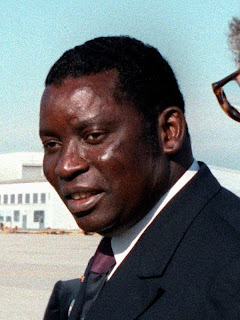
I should have posted my final blog a long time ago, but I honestly believe that it took me a semester to process through everything that I have learned from this summer. From the initial cultural shock to the eventual appreciation of the rich Kabiye culture, I had come a long way from my days as an over-the-top-enthusiastic-service-learning student who thinks that she can "help" these people with book smarts. In reality, listening, empowering and being there for the people in Togo was the best thing I could do to "help" them.

I had went into CMS expecting to observe some major need and being able to help them to create a plan to solve it. As my summer progressed, I realized that the CMS was a well established clinic. Their programs were running fine. The issues that they had weren't anything that I could help to fix in a two month period, especially when I did not observe them until the last few weeks.
For example, the French Ministry of Health decided to discontinue medical donations to this region of West Africa due to the abuse in distributing these drugs. There was nothing I could do while in Africa to help them. I did come back and inquire about medical bridegate, but they requested that only doctors can request for these supplies. Another example was the need for more public health education. The l'assistant d'hygiene was not doing all part of his job. So I suggested for the next student intern to take on the job of the public health educator and visit villages. Of course, I only realized this need when I was ready to leave.

However, through my shadowing and endless conversations with the nurses and the staff at CMS, I realized that they had a non-medical need that I did not anticipate--encouragements on their jobs. From my observations, most of the staff comes from the Southern part of Togo, which is culturally different from the North. Most of them were sent by someone to work in the rural region. They had given up electricity, time with family and kids to come to work in Farendé. The director had been a successful young nurse in Lomé, but when the village asked him to come back and serve the people of his parent's village, he reluctantly left a life of exploration at the age of twenty-seven to work in a somewhat dead-end job in this rural village. Several nurses live away from their families and miss their children terribly. The accountant hardly ever leaves the clinic ground (since he lives on the grounds of CMS) to mingle with the local population. This lack of social support is affecting the staff's enthusiasm for their jobs and the turn-over rate at the clinic.
Thus, the only thing I could do for them is to encourage and confirm what they have done for the health of the people in the village is worth it. I spend whatever time I could find listening to these nurses talk about how they miss their families. I sent a thank you card to the director at the end of summer and said that though no thanks are uttered, many (including me) are grateful for their sacrifices to bring basic care to the local people. I hope that with this poster and their pictures (they don't get to take photos much at all), they would feel more uplifted in their spirits.
With the case de sante in Kuwde, I was able to set up an insurance system and drafted an insurance policy in French for the village. But for CMS, I took a lot more from them through my shadowing experience with them. Being there, encouraging them was all that I could do. Yet, knowing those people's more-than-adequate abilities, maybe what I did was all that they needed.
For me, I will somehow incorporate this summer into the rest of my time at Duke. I will be taking some more development and service courses. With that said, I had an awesome time, and I will not forget the lives that have touched mine.

Here are some links to the photos that are on facebook (I will try to find a way to use Pisca online album):
Highlights from Togo
I ended up taking a trip to Ghana after my time in Togo. We ended up in a Benin middle school touring group and visited a national park as well as the slave castles. Here are the photos.









